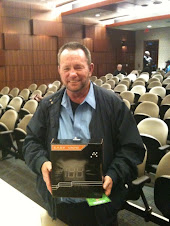
A contest to pick the best medicinal marijuana in Michigan may go up in smoke as the event's organizer and local law enforcement officials argue over whether the judging is legal.
The Michigan Caregiver's Cup expo, designed to educate state residents on how to grow, dispense and use medical marijuana, is to be held Jan. 29-31 at an Ypsilanti conference center.
But organizer Anthony Freed, executive director of the Michigan Marijuana Chamber of Commerce, said Friday he has moved the marijuana judging -- where state-registered medical marijuana users test samples from state growers and choose favorites -- to an offsite location. The decision came after local prosecutors deemed the contest illegal.
"I don't believe I'm doing anything illegal," Freed said Friday.
Washtenaw County Chief Assistant Prosecutor Steve Hiller disagrees, but wouldn't say whether the Prosecutor's Office has consulted law enforcement on the possibility of arrests.
Growing pains
Michigan medical marijuana proponents will literally go through growing pains, say supporters in states where the drug's use for medical purposes has been legal for years.
"I compare it often to the Jim Crow laws, where they gave people the right to vote but not the right to practice it," said Nathan Sands, communications director for the Compassionate Coalition, an activist group based in California -- the first state to approve medical marijuana use, in 1996.
"So if you give them the right to use it, but no ability to obtain it, it is the exact same thing as a Jim Crow law."
On Nov. 4, 2008, Michigan joined 13 states -- Alaska, California, Colorado, Hawaii, Maine, Montana, Nevada, New Jersey, New Mexico, Oregon, Rhode Island, Vermont and Washington -- in allowing pot's medicinal use.
Freed designed the first Caregiver's Cup on Jan. 29-31 in Ypsilanti as an educational forum to teach people how to do it right.
The event at the Marriott at Eagle Crest will offer lectures and classes on everything from the civil rights of pot users and how to become a caregiver or qualified user, to hydroponics and cooking with cannabis.
But he said he's moving one of the main events -- a judging of marijuana grown and dispersed by Michigan caregivers -- to a secret location after local prosecutors questioned the competition's legality.
He said he may cancel the judging altogether if the threat of arrest heats up.
"I'm not interested in getting a bunch of people arrested," Freed said. "I'm not interested in getting any members of my staff or myself arrested either. I've got two kids."
For the judging, caregivers each will pay $200 and donate 2.5 ounces of marijuana they've grown to be judged on presentation, smell, feel, taste and effectiveness. Judges pay $250 to smoke or inhale vapors from up to 100.5 grams of marijuna before they vote.
Hiller said his office will support the arrest of those who participate in testing. He said the contest violates the law, which he believes limits caregiver's distribution to five patients.
"We're not going to give" the marijuana group "permission to do something we believe is illegal," Hiller said Friday. "That's never going to happen."
Jeremy Miller, executive director of the Olympia Patients Resource Center, a medical marijuana resource center in Washington state, said caregiver contests are held there without opposition, despite the state limiting caregivers to only one patient.
Their way around it: Patients "sign in" with their caregiver, get their allotted amount of marijuana to test, then sign out a couple of minutes later.
He said he's not surprised, though, that the Michigan event is facing opposition so soon after legalization of medical marijuana.
"They're going to test the waters," he said. "They're going to see how far they can push."
Vivian McPeak, executive director of Seattle's Hempfest, a political rally that draws 200,000 people each August, said he's also not surprised that Michigan organizers are facing resistance.
"But sometimes it's not worth the battle," he said. "You'll spend money on legal fees. Sometimes they fight you even if they don't win in the end because they think it will disrupt you."
He said most contests in his area happen underground.
"I would suggest they take their cup out of the hotel and they make it a private event," he said.
"I'm sure it would be a more successful event that way."
BY TAMMY STABLES BATTAGLIA
FREE PRESS STAFF WRITER


No comments:
Post a Comment